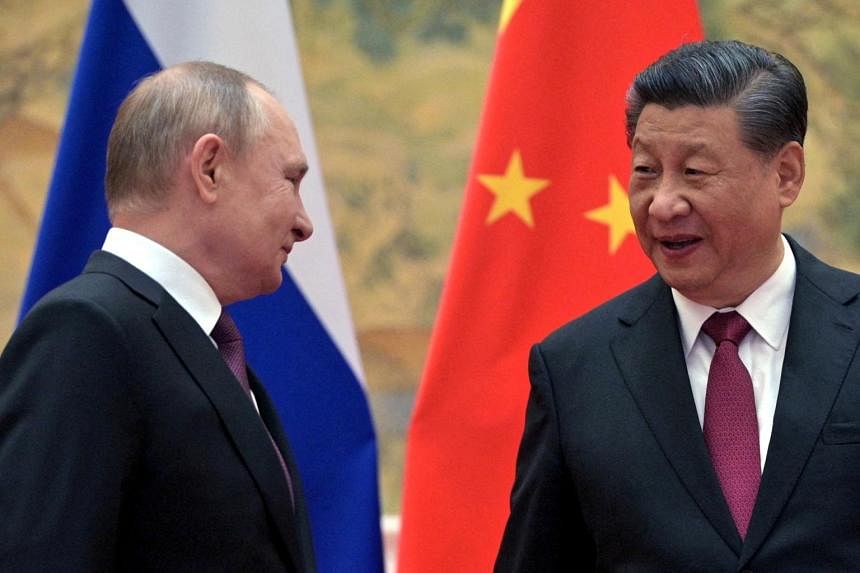BEIJING - Russia may be enduring big battlefield losses in Ukraine and punishing Western sanctions, but China is standing firm in its support of President Vladimir Putin and a "no limits" friendship.
Chinese President Xi Jinping is set to meet Mr Putin during a regional summit in Uzbekistan this week, in a public show of unity that flies in the face of US-led campaign to isolate Russia over its war in Ukraine.
While Beijing has not explicitly endorsed Moscow's invasion, it has steadily built economic and strategic ties with Russia over the six months of the war, and Mr Xi has assured his counterpart of his support of Russian "sovereignty and security".
Analysts say that as China-United States relations plummet, Beijing believes it needs to nurture the bond with its giant northern neighbour.
"Regardless of whether Russia wins (in Ukraine), China will pursue a close alignment with Russia, which is decided by the current state of US-China relations more than anything else," said Ms Yun Sun, director of the China programme at the Washington-based Stimson Centre.
As the world's second-largest nuclear power, "Russia is not a geopolitical power that can be eliminated", Ms Sun said.
China sees Russia as an important partner in muscling international institutions away from Washington's sphere of dominance.
On Monday, senior Chinese diplomat Yang Jiechi told Russian ambassador to China Andrey Denisov that Mr Xi and Mr Putin could work together to "promote the development of the international order in a more just and rational direction".
And in terms of trade, China has ramped up its purchases of oil from Russia in recent months, with Russia becoming China's top oil provider for three months in a row from May to July, helping to offset Moscow's losses.
China-US relations have been fraught for years, with a trade war showing no signs of easing while Washington accuses Beijing of human rights abuses.
In August, ties hit a dramatic new low when US House Speaker Nancy Pelosi visited self-ruled Taiwan, enraging Beijing which views the island as part of its territory.
The Chinese government responded with massive military drills and missile launches around Taiwan, and cancelled cooperation with the US in multiple areas including key climate talks.
Last week, Mr Xi sent his government's top legislator Li Zhanshu to Russia, where he met Mr Putin.
"Political mutual trust, strategic coordination and pragmatic cooperation between the two countries have reached an unprecedented level," Mr Li said, according to state media.
Mr Li's visit came as Russia endured a series of major military reversals in Ukraine, with Kyiv's troops recapturing swathes of territory.
But if Russia is "weakened in the war, it's not necessarily bad news for China, as it will become more dominant in the bilateral relations" Ms Sun said.
A closer look at Mr Li's trip also reveals that China is still keen to avoid being hit by Western sanctions over the Ukraine war - even as Moscow portrays Beijing as a backer of its invasion.
Russia claimed in a parliamentary readout that Mr Li had said "we fully understand the necessity of all the measures taken by Russia aimed at protecting its key interests, we are providing our assistance".
The line did not appear in China's official reports of the interaction, hinting at a disconnect in the two sides' messaging.
"As Russia's position deteriorates, Putin will look for increased Chinese support," said Dr Hal Brands, global affairs professor at the Johns Hopkins School of Advanced International Studies, in comments posted on Twitter last week.
Mr Xi and Mr Putin are set to meet in person this week, on the sidelines of a regional leaders' summit.
It will be their first meeting since the Russian leader visited Beijing in February, where the two presidents declared that "friendship between the two states has no limits".
The meeting takes place "at a moment of great fluidity on the battlefield, which may mean Russia is especially hopeful for Chinese assistance", said Dr Joseph Torigian, a foreign policy expert at the American University in Washington.
"We don't know how hard the asks will be and how much China thinks it could help without sacrificing its own economic interests," he said. AFP

